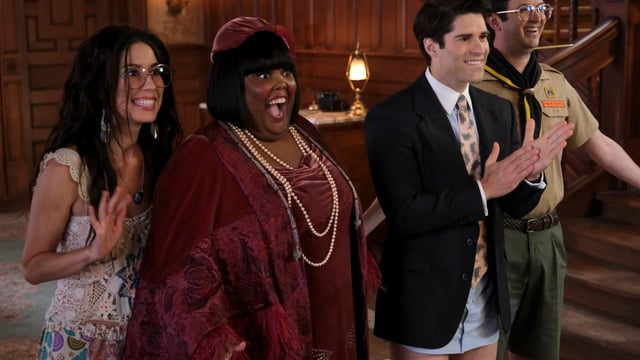
The Unseen Hand: How Ghosts Toppled a Titan
The crisp autumnal air carried more than just the scent of pumpkin spice this past fall. It also carried the unmistakable buzz of a comedic coup. "Ghosts," the quirky, ensemble comedy following a young couple who inherit a haunted mansion, had not only premiered to critical acclaim, but had also dethroned the long-reigning comedy king, "Young Sheldon," becoming the most watched comedy premiere of the fall season. This unexpected victory wasn't just a blip on the Nielsen radar; it was a testament to the evolving tastes of the audience, the strength of ensemble storytelling, and the enduring appeal of finding humor in the unexpected.
"Young Sheldon," a prequel to the beloved "Big Bang Theory," had enjoyed a near-unbreakable reign for years. Its nostalgic charm, family-friendly humor, and relatable coming-of-age narrative had consistently drawn in viewers, cementing its position as a primetime staple. Its success lay in its predictability, its familiar characters, and its gentle, comforting humor. However, in a media landscape increasingly saturated with formulaic sitcoms, comfort can easily become complacency.
"Ghosts," on the other hand, arrived with a refreshing blast of originality. Centered around Samantha and Jay, a millennial couple who unexpectedly inherit a dilapidated mansion, the show's brilliance lies in the ensemble cast of quirky, historical ghosts that haunt the premises. Each ghost, a relic of a different era, brings a unique perspective and comedic style to the table. From the overly enthusiastic Revolutionary War soldier to the cynical jazz singer, the show's diverse cast allows for a wide range of comedic scenarios, each grounded in their individual backstories and eccentricities.
One could argue that the success of "Ghosts" lies in its ability to blend the familiar with the novel. While the premise of a haunted house is hardly new, the show elevates the trope by focusing on the complexities of inter-ghost relationships and the challenges of modern living seen through the eyes of the deceased. The humor isn't simply derived from slapstick or predictable punchlines; it stems from the clash of cultures, the absurdity of history, and the poignant realization that even in death, connection and understanding are possible.
Furthermore, "Ghosts" tapped into a growing desire for ensemble storytelling. In a world where individual narratives often dominate, the show offered a tapestry of interconnected characters, each contributing to the overarching comedic narrative. This fostered a sense of community and connection among viewers, who found themselves drawn to the diverse personalities and the relatable struggles of the spectral ensemble. Unlike "Young Sheldon," which largely focused on a single protagonist, "Ghosts" offered a multitude of entry points for viewers, allowing them to find resonance with different characters and storylines.
Beyond the comedic brilliance, "Ghosts" also benefited from a shift in audience preferences. The appetite for wholesome, family-friendly sitcoms, while still present, is being challenged by a desire for more nuanced, quirky, and boundary-pushing humor. "Ghosts" managed to strike a delicate balance, offering relatable themes of love, acceptance, and self-discovery while simultaneously poking fun at historical stereotypes and societal norms. It offered a smart, witty brand of comedy that resonated with a younger, more discerning audience seeking something beyond the predictable.
The dethroning of "Young Sheldon" by "Ghosts" is more than just a statistic; it's a cultural indicator. It signals a shift in comedic preferences, a desire for ensemble storytelling, and a yearning for narratives that blend the familiar with the unexpected. "Ghosts" didn't just sneak up on the competition; it possessed the comedic spirit of the moment, tapping into the zeitgeist and offering a fresh, vibrant perspective on life, death, and the enduring power of human connection. In a world often defined by the seen and the tangible, it was the unseen hand of "Ghosts" that ultimately grasped the comedic crown, leaving its mark on the landscape of primetime television.